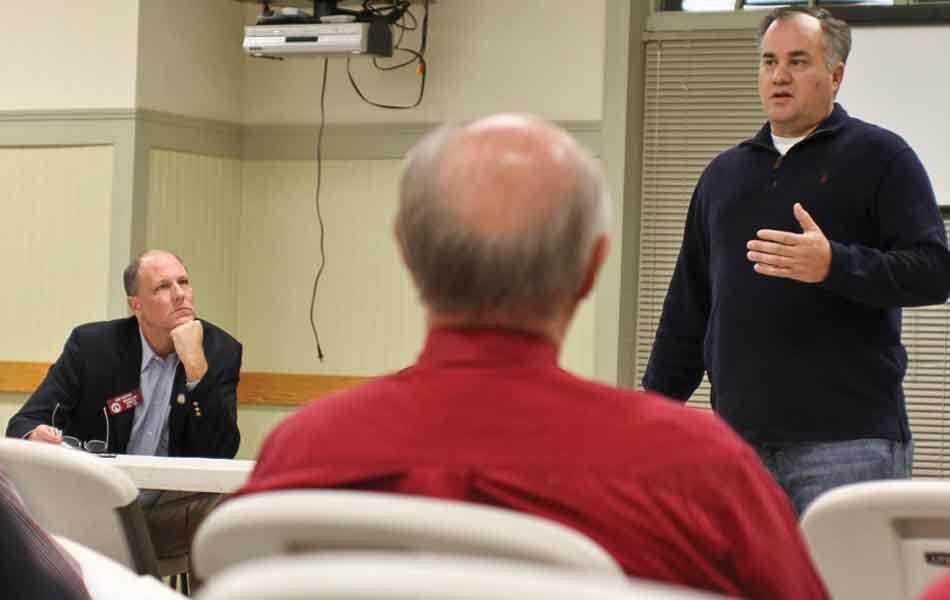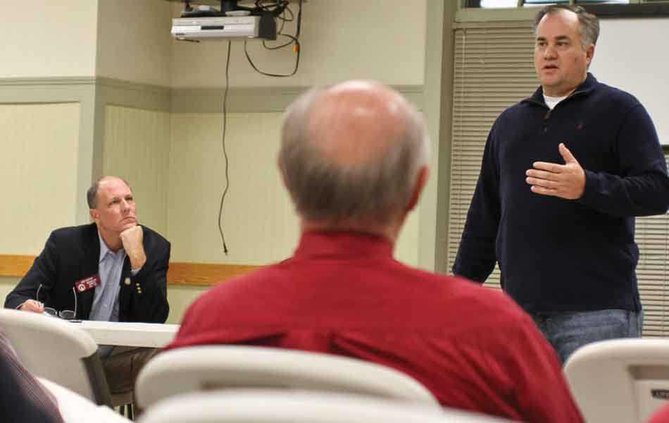SOUTH FORSYTH — Advocates of Sharon Springs, a proposed second municipality in Forsyth County, received some good news this week, though the pursuit of cityhood likely will stretch well into 2016.
The Sharon Springs Alliance on Monday announced the results of a study it commissioned from the Carl Vinson Institute at the University of Georgia.
“The feasibility study basically found out that it is feasible, that we can do a city in south Forsyth, and that was the main objective,” said Steve Benefield with the alliance.
The study, which was funded entirely by supporters, examined similarly sized municipalities and found “that likely available revenues exceed likely expenditures for the services identified to be provided, and therefore conclude that a city comprised of the Sharon Springs study area is fiscally feasible.”
The proposed limited services municipality, or “city light,” would likely cover an area of Forsyth stretching from the Fulton County line north to Hwy. 20. The eastern and western boundaries would be the Chattahoochee River/Gwinnett County and Ga. 400, respectively.
The next step in the lengthy process will involve Forsyth’s seven state lawmakers — five representatives and two senators, all Republicans — to agree on the plan and introduce it in the Georgia Legislature. A unanimous front would be preferable, officials have said.
If such a bill were to pass the legislature, residents within the boundaries of the proposed city — an estimated quarter of the county’s population — would then decide the measure in a referendum.
“We are hopeful to get a bill dropped in this legislative work session, of course that is up to the legislature,” Benefield said. “Then we’ll debate it until the next legislative session, which is 2016.”
The prospects of a Sharon Springs bill this year might be overly optimistic. The 2015 General Assembly concluded the 24thday of its 40-day session on Monday.
District 25 state Rep. Mike Dudgeon of south Forsyth, whose district covers the affected area, said Monday he had “not decided whether to push forward with the Sharon Springs bill yet,” but was “encouraged by the study.”
It was Dudgeon’s guest column last summer in the Forsyth County News that led to a series of three town hall meetings on the future of the area.
The formation of Sharon Springs was one of the forums’ topics, as was the makeup of the county commission and a potential consolidation of the county and city of Cumming.
“I want to make sure that we have a whole year to vet this and get everyone’s opinion to figure out what we want to do,” Dudgeon said. “But in theory, if we do move forward, then we’d have a bill in 2016.”
If approved, Sharon Springs would likely be a limited services municipality or “city light,” which means it must provide at least three services under state law.
“Basically [that would be] just zoning, code enforcement and sanitation,” Benefield said. “The main benefit, I think, is that we would be able to handle our own zonings rather than it coming from the Board of Commissioners.
“The people in south Forsyth feel that they have been a little misrepresented and we feel that a locally controlled government can handle the situation we’ve been given here.”
Dudgeon said the city would be modeled after Peachtree Corners in neighboring Gwinnett County, which was approved as a “city light” in 2011 and incorporated in July 2012.
“So that makes it a little different than some of … the north Fulton cities — Johns Creek, Milton, etc.,” Dudgeon said. “Those have been full-service cities with roads, parks, etc.
“Because of that, came out and showed the [city’s annual budget] would be very low, $3.8 million, which is like $75 per person or something like that. A very low rate cost, because this city is not as big as some.”
In the feasibility study, the Carl Vinson Institute considered for Sharon Springs an area whose population totals about 49,500, or 29 percent of Forsyth’s residents. The area’s median household income was listed at nearly $93,000.
The study, using an analysis of county and state figures, determined the ratio of the area to unincorporated Forsyth County was nearly 40 percent of its residential (about $2.4 billion) and 28 percent of its commercial bases ($290 million).
The study looked only at the creation of Sharon Springs. It did not explore the two other ideas discussed at the town hall meetings — unifying the Cumming and Forsyth governments or changing the method for electing county commissioners.
The study compared Sharon Springs with both Forsyth and Cumming and determined the new city would have a lower per capita rate than either.
According to its findings, the county’s budget is about $220 million and its population is 175,511, equaling about $1,250 per person. Cumming has nearly 5,500 residents and an annual budget of about $28 million, meaning the budget works out to about $5,100 per resident.
If approved, Sharon Springs would not impose property taxes or use or create a new sales tax. Benefield said the system of governance would be covered in the city’s charter. The alliance has not reached that stage yet.
Since the city would not be using property or sales taxes the largest sources of revenue would come from franchise fees — cable TV, electric, natural gas and phone lines — as well as insurance premiums and development fund and zoning and variance fees and permits.
The city would also gain revenue from occupation and hotel/motel taxes and alcohol licenses and taxes, among other sources.
Forsyth County Commissioner Brian Tam, whose District 2 covers much of the proposed city’s boundaries, said Monday he would like to review the study before making a comment.
The commission as a whole, however, has previously expressed skepticism at the proposal and the study.
At a December work session, Commissioner Cindy Jones Mills of north Forsyth said it such studies never find that a city isn’t viable.
“To me, when you talk about doing a study, what’s a study? You’re going to get all the information, you’ll have all the facts, but it’s a lopsided study,” she said “This is a big, big deal. This changes the makeup of our county from here on.”
At that same meeting, County Attorney Ken Jarrard also discussed an option that could help with zoning issues in the area.
“We could offer up an alternative, which would be to basically take the borders of this potential city and hyper-focus on the planning and land use in this area,” he said.
“There are options the board of commissioners could take fairly quickly … not something that would take three or four years, but six or eight months.”


